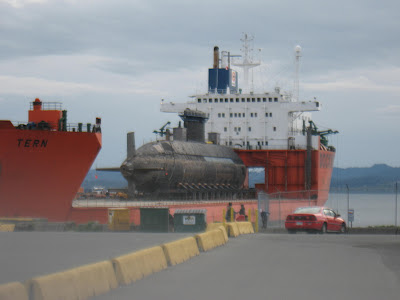Canada’s submarines are once
again in the news. The R.C.N. has recently announced that they have turned the
corner on the program to bring the Victoria
class submarines purchased by the R.C.N. in 1998 into service. It is their fond
hope that in the foreseeable future they will have at least one active boat on
each coast. As with previous pronouncements the public has taken this a certain
amount of skepticism. In fact it might even be said that the role of submarines
in the Canadian Navy has become a matter of public debate.
Because they do so much
of their work far from cameras and the citizenry that pays for them Navies in
general, and submarines in particular, have always faced difficulties in
explaining their relevance in times of peace both to the public and to the
government.
Countries, like Canada, need to
have a navy to guard (or at least manage) their own coasts. The argument has
been made that this duty can be performed by a Coast Guard. Unfortunately the
differences between the constabulary nature of Coast Guard duties and the war
fighting abilities needed to actually control one’s own seas are incompatible.
Countries, like Canada, also
need Navies to help maintain the global commons that are the oceans of the
world. Much of the wealth that Canada
enjoys comes directly or indirectly from the free flow of goods across all the
oceans of the world. Our interests lie in maintaining and strengthening the
rule of law which supports our prosperity and values. We have to be players to
have a voice in these matters; we have to have a navy to advance our own interests.
Submarines are important to a navy. They are
among the most powerful of seaborne combatants. Many experts believe that in
the event of large scale general naval warfare they are the only warships that
will matter, or even be afloat, after a short period of unrestricted warfare.
In peacetime their ability to maintain a presence, monitor large areas, and
create uncertainty with potential aggressors is unmatched. From a strictly
economic point of view they are less expensive (the word cheap seldom applies
to any navy vessel) to operate and have low logistic demands. The point here is
that Canada
should have a navy and real navies have submarines.
If the question is not ‘should Canada have submarines’ then it becomes ‘why
doesn’t Canada
have submarines?’ The problems faced by
the Navy in their attempt to bring all four of the submarines into regular
service are fairly well known by this time. Deadlines have been missed, a lot
of money has been spent and very little has been gained in terms of
effectiveness.
Much has been said about the problems of
keeping submariners skills current given the lack of working submarines to
train on, and the difficulties of regenerating a submarine force should we lose
what little sub-surface capabilities we still possess. Rather less has been said
about the Navy’s ability to manage this complex program. As well as worrying
about the atrophying skills of our submariners we should consider the
possibility that at some point, probably through lack of experience or
training, the ability to manage complex programs seems to have been lost. While
submarine crews can train with simulators and try to maintain skills it would
appear that no similar mechanism exists to maintain the staff and management
skills necessary to guide complex, expensive, procurement programs.
Until changes are made
at the military-civilian interface where such programs are managed there is no
reason to believe that other procurement exercises will go any better, or that
we will ever have a Navy with effective submarines.
